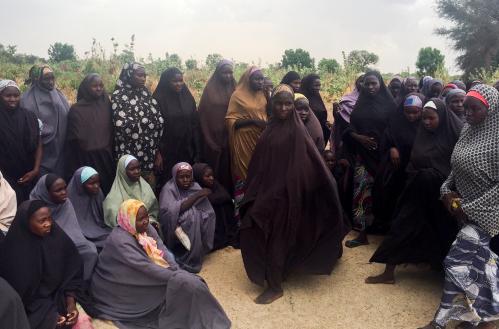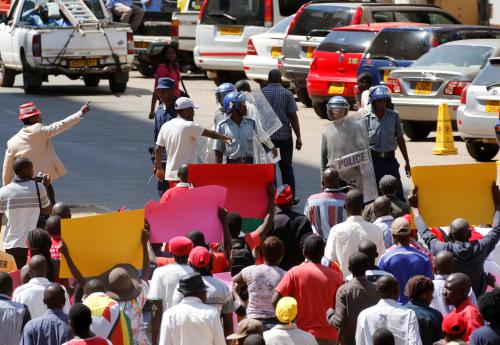The Trump administration issues plan to sell warplanes to Nigeria in the fight against Boko Haram
This week, the Trump administration announced their intention to sell 12 warplanes to Nigeria with the aim of assisting in the fight against Boko Haram. The sale, which requires congressional approval, is third attempt in three years by the United States to sell military planes to Nigeria. In January 2017, the Obama administration stopped a sale proposal from going to Congress after reports emerged that a Nigerian fighter jet, while looking for Boko Haram fighters, accidentally bombed a refugee camp, causing at least 52 deaths. During a conversation between President Muhammadu Buhari and President Donald Trump, the latter expressed support for the sale of the aircrafts. Officials from the U.S. State Department, the Pentagon, and the White House have stated that the $600 million sale would be a great asset for the Nigerian air force in the fight against Boko Haram.
This week also marks the third anniversary of the Chibok schoolgirls kidnapping. Of the 276 girls kidnapped by Boko Haram on the night of April 14, 2014, 195 are still missing. On Tuesday, Nigerian Vice President Yemi Osinbajo stated that there were ongoing negotiations with the group, and he was optimistic that the conversation would lead to the release of more schoolgirls. For security reasons, Osinbajo did not provide additional details about the nature of the negotiation. One of complications in the talks with Boko Haram came after the group’s split last year, with one fraction pledging allegiance to ISIS and the other remaining under the control of long-time leader Abubakar Shekau. Amid the split, the Nigerian government found itself negotiating with two separate entities, with each faction holding a number of Chibok girls captive.
In other news, the Nigerian Department of State Services announced this week that it has foiled plans by Boko Haram to attack U.S. and U.K. embassies in Abuja. Six people were arrested last month in relation to the plot. However, the claims were not confirmed by any independent outlets. In addition, last week, the U.S. State Department issued a travel warning urging U.S. citizens to avoid all but essential travel to northeast Nigeria, as the situation remains fluid and unpredictable.
Zimbabwe’s Parliament moves to qualify livestock and household appliances as collateral
On Tuesday, the Zimbabwean Parliament considered a bill that would allow “moveable assets,” such as livestock, vehicles, and household appliances, such as televisions, computers, and refrigerators, to qualify as collateral. The bill aims to ease restrictions preventing informal workers and entrepreneurs from accessing funding. At the moment, only $250 million of the country’s $4 billion in bank loans in the year to date have gone to small businesses. While Finance Minister Patrick Chinamasa has argued that the bill would increase access to credit and thus promote financial inclusion, bankers have expressed concerns about “the definition of assets, most of which are susceptible to rapid depreciation in value.” Currently the bill defines these assets as “any tangible or intangible property other than immovable property.”
The bill requires that the central bank create a collateral registry database of all moveable assets put up as loan security in order to “facilitate commerce, industry and other socio-economic activities.” Commercial banks would be required to accept these types of assets as security for credit. Several countries already allow moveable assets to qualify as collateral, including Nigeria, Ghana, Malawi, Kenya, Liberia, Lesotho, Peru, and Ukraine. According to Voice of America, the bill still faces several logistical stages before it will become law.
Uganda’s policies provide support to South Sudanese refugees
South Sudan’s three-and-a-half-year civil war and recently declared famine have uprooted nearly 1.7 million people from the country, more than 800,000 of whom are currently seeking refuge in Uganda. As the security situation in South Sudan continues to deteriorate, approximately 3,000 people crossed over the border into Uganda on Tuesday alone of last week, fleeing a massacre in the town of Pajok allegedly committed by South Sudanese government troops, Reuters and the Sudan Tribune report.
According to The Guardian, such an influx of arrivals is now a common occurrence in Uganda, where an average of 2,800 refugees arrived each day in March. Earlier this month, Uganda surpassed Kenya to become the host of the world’s largest refugee camp, Bidi-Bidi, which harbors at least 270,000 refugees and only opened in August 2016. Uganda has maintained open borders even as refugee flows have increased owing to its compassionate national policies toward refugees, stemming in part from the fact that many Ugandan leaders were once refugees—including current President Yoweri Museveni. In Uganda, refugees have the right work and travel, are allowed to access the same social services as Ugandans, and are given plots of land to live on and farm.
The United Nations High Commissioner for Refugees (UNHCR) spokesperson Babar Baloch called the displacement from South Sudan “the world’s fastest growing refugee crisis” last month and argued that “urgent and large-scale additional support” is needed to support Uganda and five other East African countries. UNHCR has appealed for $781.8 million in funding to support South Sudanese refugees in the region, only 8 percent of which has been met by international donors so far.
The Brookings Institution is committed to quality, independence, and impact.
We are supported by a diverse array of funders. In line with our values and policies, each Brookings publication represents the sole views of its author(s).








Commentary
Africa in the news: US to sell warplanes to Nigeria, Zimbabwe considers moveable assets as loan collateral, and Uganda’s Bidi-Bidi refugee camp becomes largest in world
April 14, 2017